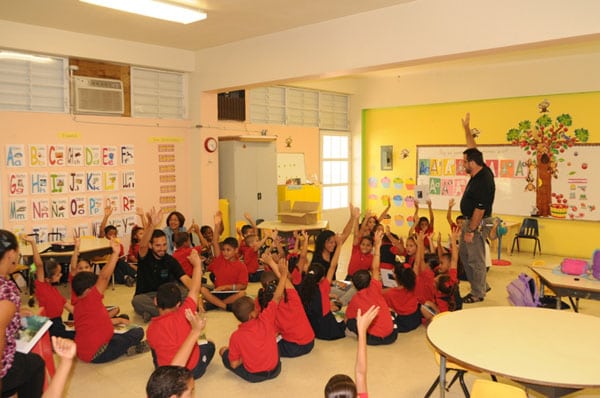
June 17, 2018; NBC News (Today)
As Gabe Gutierrez and Bianca Steward report for NBC News, “the battle for Puerto Rico’s future is underway.” One front involves schools, with teachers, parents, and students fighting to keep their schools open. “The island’s government,” note Gutierrez and Steward, “plans to close more than 250 of them.”
“Where there is no school, there is no community,” says Providencia Figueroa, who works with one of Puerto Rico’s teachers’ unions.
Noeliz Fernandez goes to school in Arecibo at the Ramón Emeterio Betances School, which was among those slated for closure. The 12-year-old has seen many of her friends leave to move to the US mainland, note Gutierrez and Steward.
“It’s going to be hard because I’ve always loved going to this school,” says Fernandez. “Seeing people leave is like I’ve lost a little piece of my childhood,” she adds.
Fortunately for Fernandez, write Gutierrez and Steward, “A judge ruled her school and several others should stay open because Puerto Rico’s Department of Education did not provide enough evidence that it should close.” But, they add, “this summer, thousands of other students like her are waiting to see the fate of their classrooms—and how this island will fare as another hurricane season begins.”
Other major challenges facing Puerto Rico include:
Sign up for our free newsletters
Subscribe to NPQ's newsletters to have our top stories delivered directly to your inbox.
By signing up, you agree to our privacy policy and terms of use, and to receive messages from NPQ and our partners.
- Intermittent electricity, particularly in mountainous areas. While power is, according to Puerto Rico’s power company, 95-percent restored, this does not mean that said power consistently stays on.
- “Puerto Rico’s main morgue is now overflowing with unclaimed bodies. Dozens of them are being kept in refrigerated containers in San Juan.”
- Asthma. ABC News separately reports that, “Doctors in Puerto Rico say they are seeing an alarming rise in the number and severity of asthma cases that they attribute to destruction caused by the deadly hurricane that walloped the island in September. The chronic lung disease is caused by such things as pollution, airborne mold, and pollen, all of which have increased post-Maria.”
The problems are intersectional, too. For example, a mother of one asthmatic child told ABC News that “weekly power outages in their coastal town of Aguadilla also feed his anxiety, which can make symptoms worse. He panics about not being able to turn on the plug-in nebulizer that helps control his attacks.”
On top of this, of course, is the loss of life and, according to the National Hurricane Center, $90 billion in damages. As NPQ covered, last month a Harvard University study estimated that more than 4,600 people might have died in the hurricane’s aftermath. This, note Gutierrez and Steward, was “dramatically higher than the government’s official count of just 64.”
For its part, Puerto Rico’s government has backed off of its own estimate. Gutierrez and Steward write that, “Under pressure, Puerto Rico’s health department then release updated figures showing about 1,200 more deaths in September and October of 2017 than during the same period the previous year.”
“We’ve been saying that the numbers were going to be much higher,” says Gov. Ricardo Rosselló. Rosselló blames federal Centers for Disease Control and Prevention protocols for the undercount of 64. “We realized that protocol was not very good,” says Rosselló.
Rosselló has also stepped up his criticism of the federal government. There are some things that I am very satisfied with,” says Rosselló. But, he adds, “there are some things that I am very dissatisfied and even appalled by. I was appalled by the Corps of Engineers’ response. I was disappointed with the bureaucracy in FEMA.”
Carmen Yulín Cruz, the mayor of San Juan, has been more vocal. “There is a total lack of empathy for the people of Puerto Rico. There was a lack of a sense of urgency.”—Steve Dubb













